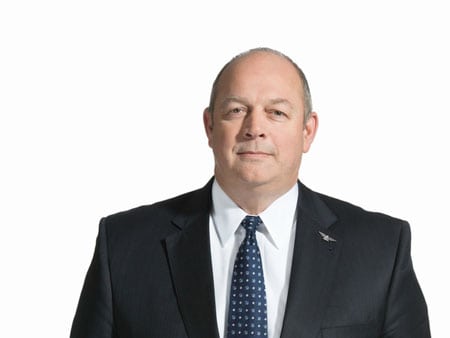
Steve Dickson, former Delta Air Lines executive, has been nominated as the next FAA administrator. Photo: Delta
The nomination of Steve Dickson as the next FAA administrator is the selection of a former Delta Air Lines executive who heavily embraced tenets of the agency’s NextGen program while opposing a proposal to separate its role as regulator and air navigation service provider.
In his former role, Dickson was responsible for the safety and operational performance of Delta’s global flight operations, as well as pilot training, crew resources, crew scheduling and regulatory compliance. Dickson is also a former U.S. Air Force officer and F-15 fighter pilot.
His nomination comes amid criticism that the FAA is facing in the wake of the March 10 crash of a Boeing 737 MAX 8 flown by Ethiopian Airlines that resulted in 157 deaths. The tragic crash — the second involving that model jetliner in less than five months — resulted in nations around the world quickly grounding their 737 MAX fleets, but the FAA was slow to respond. Members of Congress have asked the Department of Transportation’s inspector general to examine the FAA’s approach to certifying the plane.
During his tenure with Delta, Dickson was a staunch advocate for some of the elements of the FAA’s NextGen airspace system modernization program. He previously expressed his view of NextGen during a keynote speech at the 2016 Avionics Maintenance Committee (AMC) / Airline Electronic Engineering Committee (AEEC) annual meeting.
“Our CNS philosophy is communication through [Controller Pilot Datalink Communications] CPDLC and [Future Air Navigation System] FANS, navigation throughout performance-based navigation, which has several flavors to it, [including] [Required Navigation Performance] RNP, [Required Navigation Performance Authorization Required] RNP AR and even basic [Area Navigation] RNAV,” Dickson said.
Dickson would also bring a unique perspective to a proposal by U.S. lawmakers that was ultimately eliminated from the FAA’s most recent re-authorization, to create a new private entity responsible for the FAA’s current role as the nation’s air navigation service provider. Between 2015 and 2018, lawmakers attempted several times to make such a change happen, although every FAA funding bill during that time never featured the proposal.
When it first was proposed in 2015, Delta was the only airline that opposed the change. All others, represented by Airlines for America (A4A), were in favor of it. Dickson published an op-ed article at the time outlining his opposition to the change.
“Separating the ATO from the rest of the FAA does not address the efficiency or performance of the air traffic control system. Nor can it change certain structural barriers in the system, such as the geographic proximity of airports in the congested northeast corridor of the United States, or the fact that no new airports are being built in that area,” Dickson wrote in 2015.
If confirmed, Dickson will replace acting FAA administrator Daniel K. Elwell, who took charge in January 2018 following the departure of Michael Huerta, whose five-year term had expired.